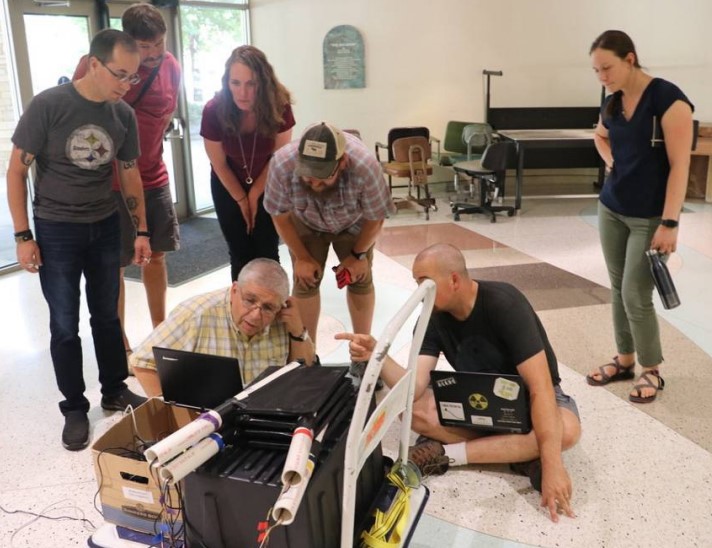Friday Flyer - March 13, 2020

Spotlight on the Colorado State University QuarkNet Center
Cherie Bornhorst and Adam Pearlstein work with mentor Bob Wilson to organize activities in Fort Collins. Last April, CSU hosted a MINERvA masterclass that included a tour of the CSU High Energy Physics labs along with a neutrino talk, MINERvA data analysis, and a videoconference with Minnesota and Fermilab. In July, eight teachers participated in a three-day workshop on campus. On the first day, teachers carried out a cosmic ray shielding investigation by comparing flux measurements at various levels of a nearby parking garage structure. The remaining two days consisted of a MINERvA data workshop that included a deeper diver into the MINERvA data used for masterclass, several related activities from the Data Activities Portfolio, and a talk by Professor Walter Toki about his neutrino research.


News from QuarkNet Central
The COVID-19 pandemic is having a big impact on International Masterclasses 2020, as demonstrated by the Fermilab-based videoconference schedule. (Note that asterisks indicate tentatively canceled masterclasses.) We know that given the current situation, everyone's health is top priority. Please read today's IMC circular, which provides more information about the impacts of COVID-19 on masterclasses, special information about the CMS measurement, and IMC on social media.
With summer workshops approaching, now is a great time to get those cosmic ray detectors tuned up and working properly.
- We have a list of teachers waiting to receive a cosmic ray detector, so if you are not using your detector, please return it (at Fermilab's cost) so it can be reassigned to a new teacher. Contact Dave Hoppert (hoppert@fnal.gov) for shipping instructions.
- If there are components of your detector that are not working properly, please contact Dave. He can either repair or replace the components.
- Several detectors still need GPS firmware updates . . . every GPS unit needs it in order to upload data since the GPS reset in April of 2019. To get this update, please contact Dave.
And lastly, there is still time for teams to put together proposals for Beamline for Schools (BL4S). It closes at the end of this month, though! Check out the BL4S notice from CERN on Twitter.

Physics Experiment Roundup
The Accelerator Neutrino Neutron Interaction Experiment (you guessed it: ANNIE) at Fermilab has seen its first neutrino events. A new result from the Relativistic Heavy Ion Collider (RHIC) provides new insight on particle interactions in neutron stars and a new way to search for symmetry violations. A new analysis from the LHCb collaboration continues to find "tension with the Standard Model." And see how machine-learning can be used in the analysis of LHC data.

Resources
The National Science Foundation has partnered with AAPT and IBM to provide two quantum computing workshops for high school teachers during the summer of 2020. Travel to Washington, DC will be covered and a $500 stipend provided for teachers who are accepted to participate in one of these workshops. Click here for more details and for a link to the application.
The Perimeter Institute recently held their annual Inspiring Future Women in Science conferece. Click here to watch some of the speakers and panelists addressing a crowd of high school students at the conference.
Is the universe expanding? Current measurement techniques disagree on the answer. The Physics Girl presents and explains a "spoon riddle" that asks, "What happens to your reflection if you bend a spoon inward?"

Just for Fun
You can always count on fun and excitement with Van de Graaf generator demos. Here are a few demos to watch from Dr. Ben Still (@benstill): bouncing mylar strips, lighting a Bunsen burner, visualizing electric field, and the classic repelling aluminum pans.
Brookhaven National Lab recently held a 2020 Bridge Building Competition. Watch as the bridges are put to the test, or simply check out the competition results.
QuarkNet Staff:
Mark Adams: adams@fnal.gov
Ken Cecire: kcecire@nd.edu
Spencer Pasero: spasero@fnal.gov
Shane Wood: swood5@nd.edu
